Reported road casualties in Great Britain: pedal cycle factsheet, 2021
Published 29 September 2022
This factsheet presents trends from 2004 onwards. However, grouped data for years from 2016 to 2021 is used widely in order to allow sufficiently robust analysis by age, sex and other variables.
This factsheet gives an overview and key statistics on pedal cyclists involved in road collisions in Great Britain as reported by or to the police. This factsheet examines the main trends in collisions involving pedal cyclists and the casualties involved.
Pedal cyclists are one of the vulnerable user groups. They are not protected by a vehicle body in the same way car users are, and tend to be harder for drivers to see on the road. They are, therefore, particularly susceptible to injuries.
Data in this factsheet is from 2004 onwards. Serious and slight injuries have been adjusted to account for changes in the severity reporting systems. More information on the change and adjustment process is available in the Reported Road Casualties GB Annual report 2021.
It should be noted that it has been long known that a considerable percentage of non-fatal casualties are not reported to the police. Non-fatal casualties for pedal cyclists are amongst the most likely to be under-reported in road casualty data since cyclists have no obligation to inform the police of collisions. This should be borne in mind when analysing and interpreting the data.
Main findings
Between 2004 and 2021:
-
fatalities decreased from 134 to 111 (-17%)
-
serious injuries (adjusted) rose by 27%
-
pedal cycle traffic grew by 62%
Averaged over the period 2016 to 2021:
-
an average of 2 pedal cyclists died and 84 were seriously injured (adjusted) per week in reported road casualties
-
a majority of pedal cycle fatalities (59%) do not occur at or within 20m of a junction compared to 32% of all seriously injured (adjusted) casualties
-
almost half (46%) of pedal cycle fatalities were in 2 vehicle collisions between a pedal cycle and a car
-
56% of pedal cycle fatalities occurred on rural roads compared to 29% of traffic
-
82% of pedal cycle killed or seriously injured (KSI) casualties were male
-
the most common contributory factor allocated to pedal cyclists in fatal or serious collisions (FSC) with another vehicle was ‘driver or rider failed to look properly’. It was also the most common factor allocated to the other vehicles involved
Pedal cycle traffic and reported casualties
In 2021, 111 pedal cyclists were killed in Great Britain, whilst 4,353 were reported to be seriously injured (adjusted) and 11,994 slightly injured (adjusted).
Table 1 and chart 1 show that pedal cycle traffic has risen between 2004 and 2021 faster than serious injuries whilst fatalities and slight injuries have fallen.
The overall number of pedal cyclist casualties fell each year from 2014 to 2020, but there was an increase between 2020 and 2021.
During 2021, pedal cyclist fatalities fell by 21% while pedal cyclist traffic fell by 21%.
Chart 1: Index of pedal cycle traffic and reported pedal cyclist casualties by severity, GB: 2004 to 2021 (Index 2004=100)
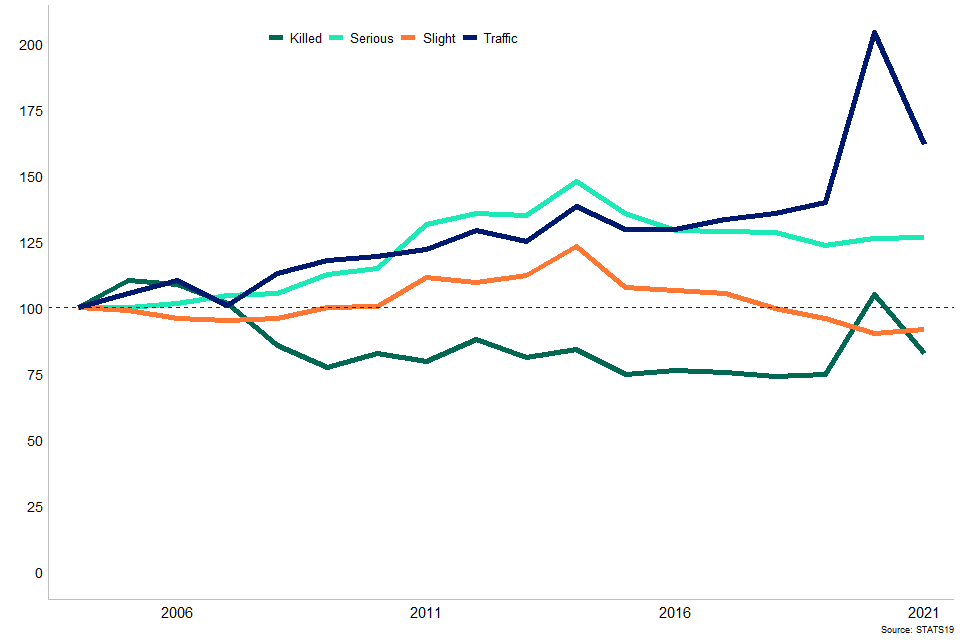
Table 1: Number of reported pedal cycle casualties by severity and traffic (pedal cycle billion vehicle miles), GB: 2004 to 2021
| Year | Killed | Serious | Slight | All | Traffic |
|---|---|---|---|---|---|
| 2004 | 134 | 3,436 | 13,078 | 16,648 | 2.59 |
| 2005 | 148 | 3,444 | 12,969 | 16,561 | 2.73 |
| 2006 | 146 | 3,488 | 12,562 | 16,196 | 2.86 |
| 2007 | 136 | 3,593 | 12,466 | 16,195 | 2.62 |
| 2008 | 115 | 3,625 | 12,557 | 16,297 | 2.93 |
| 2009 | 104 | 3,871 | 13,089 | 17,064 | 3.06 |
| 2010 | 111 | 3,943 | 13,131 | 17,185 | 3.10 |
| 2011 | 107 | 4,517 | 14,591 | 19,215 | 3.17 |
| 2012 | 118 | 4,661 | 14,312 | 19,091 | 3.35 |
| 2013 | 109 | 4,636 | 14,693 | 19,438 | 3.24 |
| 2014 | 113 | 5,074 | 16,100 | 21,287 | 3.59 |
| 2015 | 100 | 4,662 | 14,082 | 18,844 | 3.37 |
| 2016 | 102 | 4,440 | 13,935 | 18,477 | 3.36 |
| 2017 | 101 | 4,434 | 13,786 | 18,321 | 3.46 |
| 2018 | 99 | 4,420 | 13,031 | 17,550 | 3.52 |
| 2019 | 100 | 4,247 | 12,536 | 16,883 | 3.63 |
| 2020 | 141 | 4,335 | 11,818 | 16,294 | 5.30 |
| 2021 | 111 | 4,353 | 11,994 | 16,458 | 4.20 |
Source: DfT STATS19 and National Road Traffic Census
How far do pedal cyclists travel?
There are two sources of cycling distances travelled published by the Department:
The National Travel Survey (NTS) which provides the number of trips and average distance travelled by person per year for English residents. This is used to derive casualty rates per mile travelled for pedestrians.
The National Road Traffic Census estimates based on annual traffic count data which produces total vehicle miles cycled by type of road. This is used to derive casualty rates per mile travelled for vehicle occupants.
Casualty rates per mile travelled
The pedal cycle casualty rate has fallen for all severities in 2021 compared to 2004.
The overall casualty rate fell by 39%. The fatality rate fell by 49% compared to 22% for serious injuries and 43% for slight injuries.
Chart 2: Index of casualty rates of pedal cycle casualties by severity, GB: 2004 to 2021 (Index 2004=100)
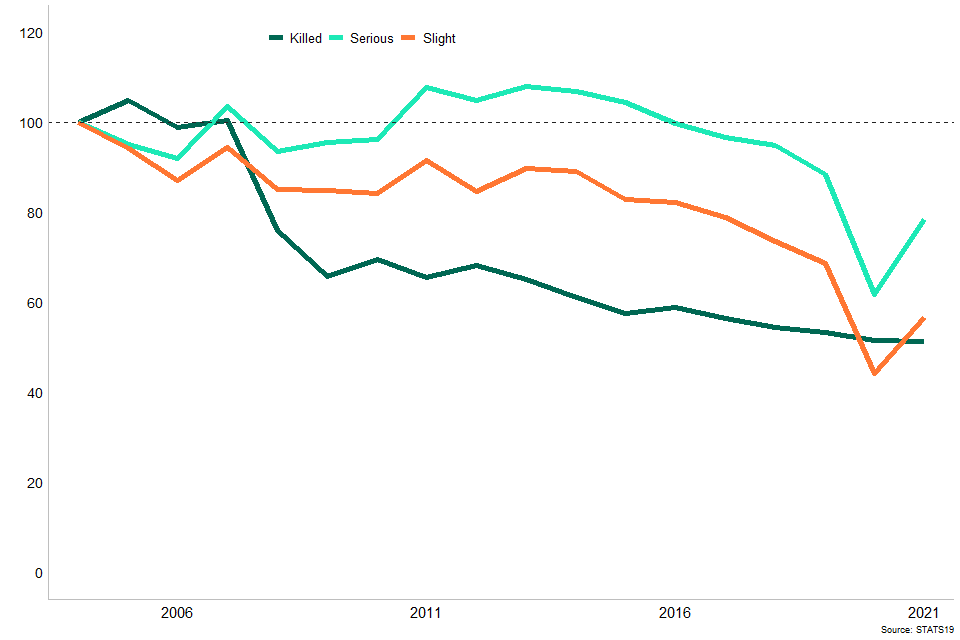
Table 2: Casualty rates of pedal cycle casualties by severity per billion vehicle miles travelled, GB: 2004 to 2021
| Year | Killed | Serious | Slight | All |
|---|---|---|---|---|
| 2004 | 52 | 1,324 | 5,040 | 6,416 |
| 2005 | 54 | 1,260 | 4,743 | 6,057 |
| 2006 | 51 | 1,219 | 4,389 | 5,659 |
| 2007 | 52 | 1,370 | 4,754 | 6,177 |
| 2008 | 39 | 1,237 | 4,285 | 5,562 |
| 2009 | 34 | 1,265 | 4,278 | 5,577 |
| 2010 | 36 | 1,273 | 4,240 | 5,549 |
| 2011 | 34 | 1,427 | 4,609 | 6,070 |
| 2012 | 35 | 1,389 | 4,266 | 5,690 |
| 2013 | 34 | 1,429 | 4,529 | 5,991 |
| 2014 | 32 | 1,415 | 4,489 | 5,936 |
| 2015 | 30 | 1,384 | 4,181 | 5,594 |
| 2016 | 30 | 1,321 | 4,144 | 5,495 |
| 2017 | 29 | 1,280 | 3,979 | 5,289 |
| 2018 | 28 | 1,256 | 3,702 | 4,986 |
| 2019 | 28 | 1,171 | 3,455 | 4,653 |
| 2020 | 27 | 818 | 2,230 | 3,075 |
| 2021 | 26 | 1,037 | 2,857 | 3,920 |
Sex and age comparisons
Between 2016 and 2021, 82% of pedal cycle KSI casualties were male and 18% female.
There are 5 times more male than female pedal cycle KSI casualties overall. This compares to 11 times more for 12 to 15 year olds and 3 times more for 25 to 29 year olds.
Chart 3: Percentage of pedal cycle KSI casualties, by sex and age, GB: 2016 to 2021
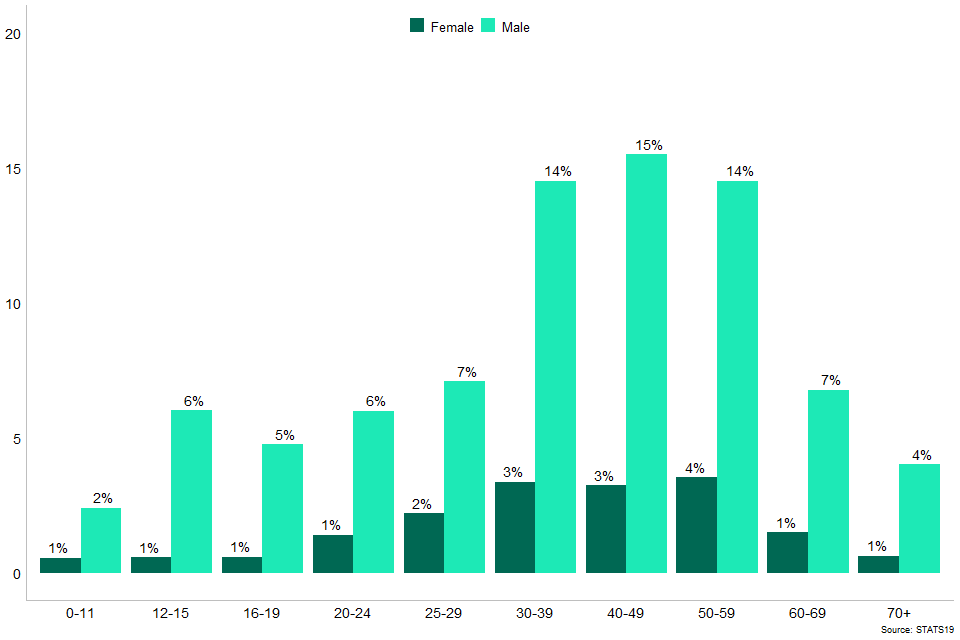
Which other vehicles are involved in collisions with pedal cyclists?
Between 2016 and 2021, most pedal cycle fatalities occurred in 2 vehicle collisions involving a car (301).
However, the highest proportion of casualties that are fatal occur in 2 vehicle collisions involving an HGV (6.6%). However, the second highest proportion (2.1%) occurred in collisions when no other vehicle was involved.
Table 3: Pedal cycle casualties in reported road collisions by severity showing other vehicles involved, GB: 2016 to 2021
| Other vehicles | Fatalities | Serious injuries | Slight injuries | All casualties | % Fatalities |
|---|---|---|---|---|---|
| No other vehicles involved | 101 | 2,020 | 2,650 | 4,771 | 2.1% |
| 1 pedal cycle | 4 | 380 | 587 | 971 | 0.4% |
| 1 motorcycle | 6 | 420 | 1,425 | 1,851 | 0.3% |
| 1 car | 301 | 19,082 | 61,518 | 80,901 | 0.4% |
| 1 bus or coach | 14 | 367 | 1,031 | 1,412 | 1.0% |
| 1 light goods vehicle | 51 | 1,918 | 5,549 | 7,518 | 0.7% |
| 1 heavy goods vehicle | 89 | 454 | 810 | 1,353 | 6.6% |
| 1 other vehicle | 23 | 492 | 1,212 | 1,727 | 1.3% |
| 2 or more other vehicles involved | 65 | 1,097 | 2,317 | 3,479 | 1.9% |
| Total | 654 | 26,229 | 77,100 | 103,983 | 0.6% |
Time of day of collisions
The weekday peak time for pedal cyclist KSIs is from 7am to 10am and from 4pm to 7pm. By contrast, the pattern differs for Saturday and Sunday for both trips and KSIs. During the weekend there is a single peak around mid-morning (10 am to 12 noon) which gradually tails off during the afternoon and evening
Chart 4: Reported pedal cyclist KSIs by hour of day and day of week, GB: 2016 to 2021
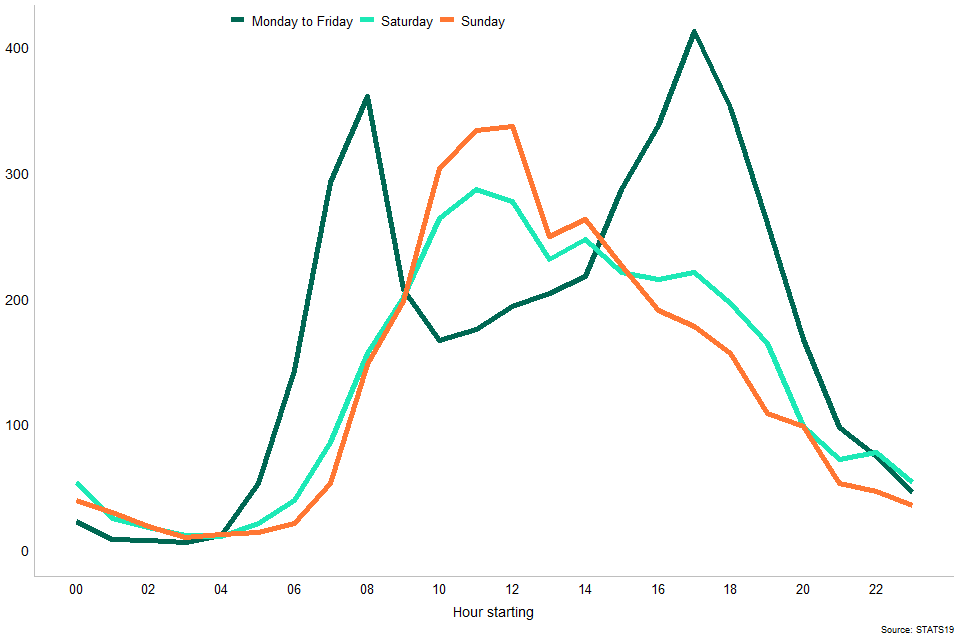
What type of road?
Chart 5 shows that between 2016 and 2021, 56% of pedal cycle fatalities occurred on rural roads compared to 29% in traffic. The proportion of non-fatal casualties on rural roads, however, were lower than the proportion of traffic.
Chart 5: Percentage of pedal cycle casualties, by urban rural classification and severity and traffic, GB: 2016 to 2021
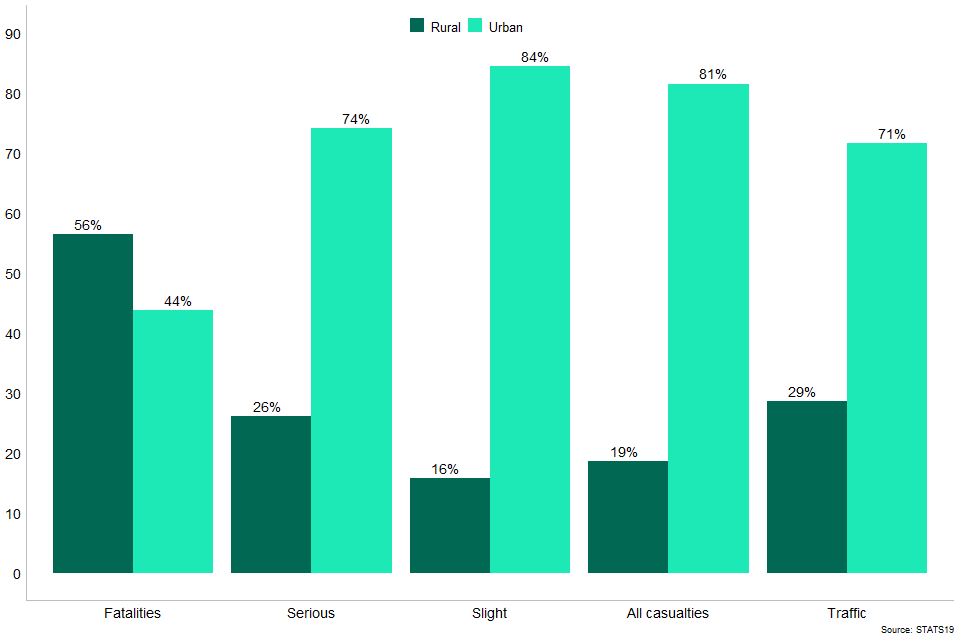
Urban roads are those within an area of population of 10,000 or more. The definition is based on the 2001 Communities and Local Government definition of Urban Settlements. Roads outside these areas will be classified as Rural. More information is available in the user guide to urban and rural area definitions.
Vehicle movement on the road
A majority of pedal cycle fatalities (59%) do not occur at or within 20m of a junction compared to 32% of serious injuries (adjusted). However, 25% of fatalities occur at a junction compared to 41% of serious injuries (adjusted). Pedal cycle fatalities at roundabouts represent 5% of all fatalities in contrast to 13% of serious injuries (adjusted).
Table 4: Percentage of pedal cycle KSI casualties by severity and junction detail where the collision occurred, GB: 2016 to 2021
| Junction | Fatalities | Serious | Slight | All Casualties |
|---|---|---|---|---|
| Crossroads | 10.1% | 9.7% | 10.6% | 10.3% |
| T, Y or staggered junction | 21.1% | 35.8% | 37.7% | 37.1% |
| Junction - more than 4 arms (not roundabout) | 0.9% | 1.2% | 1.3% | 1.2% |
| Other junction | 2.8% | 4.0% | 4.5% | 4.4% |
| Roundabout | 4.3% | 10.9% | 11.6% | 11.4% |
| Mini-roundabout | 0.3% | 1.9% | 2.3% | 2.2% |
| Slip road | 0.8% | 0.6% | 0.7% | 0.7% |
| Private drive or entrance | 1.1% | 3.2% | 3.4% | 3.3% |
| Not at junction or within 20 metres | 58.7% | 32.2% | 26.5% | 28.1% |
| Unknown | 0.0% | 0.5% | 1.4% | 1.2% |
Contributory factors in collisions
Contributory factors provide an insight into how and why collisions occur. The factors are largely subjective as they reflect the opinion of the reporting police officer. They are assigned quickly at the occurrence of the collision and often without extensive investigations and so should be interpreted with caution. They are likely to be affected in part by preconceptions police officers have of certain vehicle groups. A maximum of six factors can be recorded for each collision.
Table 5 shows the ten most common contributory factors that have been allocated to pedal cyclists that have been involved in fatal or serious collisions (FSC) (between 2016 and 2021) and contrasts this with the number allocated to non-pedal cyclists in these collisions.
The 3 most common contributory factor assigned to both pedal cyclists and other vehicle types was ‘failed to look properly’ followed by a failure ‘to judge other person’s path or speed’ and ‘driver or rider careless, reckless or in a hurry’.
The fourth most common factor allocated to pedal cyclists was ‘cyclist entering the road from pavement’. For other vehicles in collision with them the fourth most common was ‘poor turn or manoeuvre’ .
Table 5: Contributory factors allocated to vehicles involved in fatal or serious collisions with pedal cycle, GB: 2016 to 2021
| Contributory Factor | pedal cyclists | non-pedal cyclists | Any vehicle involved |
|---|---|---|---|
| Driver or rider failed to look properly | 3,624 | 7,290 | 10,914 |
| Driver or rider failed to judge other person`s path or speed | 1,574 | 2,420 | 3,994 |
| Driver or rider careless, reckless or in a hurry | 1,225 | 1,975 | 3,200 |
| Cyclist entering road from pavement | 1,097 | 88 | 1,184 |
| Poor turn or manoeuvre | 718 | 1,568 | 2,286 |
| Rider wearing dark clothing | 573 | 44 | 617 |
| Loss of control | 552 | 150 | 702 |
| Travelling too fast for conditions | 373 | 194 | 567 |
| Not displaying lights at night or in poor visibility | 367 | 21 | 388 |
| Driver or rider impaired by alcohol | 302 | 168 | 470 |
Further information
Further information on road collisions and casualties can be found in Reported Road Casualties in Great Britain.
Published tables on casualties in reported road collisions are available.
Non-fatal casualties since 2016 have been affected by a large number of police forces changing their reporting systems which has had a large impact on the classification of injuries recorded. Further details of the adjustment for this are in the 2021 annual report.
Road collisions and safety statistics guidance including accompanying notes and definitions are available.
Personal travel statistics within Great Britain covering English residents is available from the National Travel Survey.
Road traffic statistics provide estimates of the vehicle miles travelled each year in Great Britain by vehicle type, road category and region.
Instructions for printing and saving
Depending on which browser you use and the type of device you use (such as a mobile or laptop) these instructions may vary.
Tablets and mobile devices normally have the option to “find in text” and “print or save” in their sharing or quick options menu of their browser, but this will vary by device model.
How to search
Select Ctrl and F on a Windows laptop or Command and F on a Mac
This will open a search box in the top right-hand corner of the page. Type the word you are looking for in the search bar and press enter.
Your browser will highlight the word, usually in yellow, wherever it appears on the page. Press enter to move to the next place it appears.
Contact details
Road safety statistics
Email roadacc.stats@dft.gov.uk
